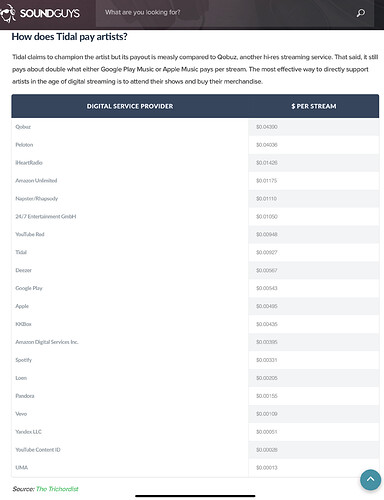Sturgeon’s Law is perhaps more applicable.
That’s a new one on me but I like it and will use it some.
I remember seeing Peter Buck, the guitarist for REM, being interviewed in the late 80s and being asked what he thought about Rap music. To my surprise he quoted what was (unbeknownst to me at the time) Sturgeon’s Law and said that Rap was like everything else and that 90% of it was crap.
However, it also means that 10% of any genre is worth seeking out and those words guided my musical journey ever since.
Overall, a User-Centric allocation would (re)distribute revenue shares downwards relative to the current “Big Pool” allocation. Whether that would benefit some particular obscure artist is not obvious. But (according to the only detailed study I’ve seen on the topic), the share of revenues going to the top 0.4% of artists would drop from 9.9% to 5.6%. That’s a big chunk of money …
Interesting read… the streaming model isn’t sustainable, neither is the subscription model, but I suppose it’s something we’ll have to live through until the big next idea. In the meantime, Bandcamp!
Bandcamp integration with purchase ability would be my number one feature request. IMHO there’s a moral imperative there.
Has this streaming royalty calculator been posted yet?
With such low prices, it’s interesting to see how artists and writers will be paid for their work now and going forward, the outlook is even worse.
I understand the lure of cheaper services but cheap does not equate to value in my book. I am already coming across artists who are questioning how they will fund their next album and the general devaluation of music is hitting sales of music after gigs (when they return). People won’t buy CD’s and often can’t afford vinyl. Creating and taking vinyl on tour for a smaller artists is an almost impossible commitment financially and logistically.
You have heard the saying, A musician has £10,000 of equipment in a £500.00 vehicle…
I urge people to buy physical media from artists and pay more for streaming to services that pay artists at the upper end of the scale. Let’s hope artist remuneration improves as the streaming model shakes out. Believe it or not, these are early days in the world of streaming and the new artists are being choked out.
If there’s real numbers to tell me that Tidal is better by volume and with percentages to artists than say, Amazon HD, I’m happy to consider. As a rule if I am interested in a particular album I always purchase it via iTunes. Often for the selfish reason that download allows me to plug it into other programs and slow it down and learn bits of it.
I don’t really care where the music data is stored; as a download or rip on my NUC or somewhere in the cloud (Qobuz streaming). Buying albums to support artists is a noble thing to do, but kind of tedious (downloading/ripping and transferring the data to local storage). Sound quality should be about the same local storage vs streaming. So why not have a button in Roon: Support artist with 5/10/15€. You could continue streaming the music but you could support the artist directly (Roon gets 1-5%??). Maybe this is a feature request?
Isn’t that what Tidal is doing now with their premium subscription, paying more $ to the artists you stream? What they refer to as Fan-Centered Royalties.
A potentially interesting development - but because it was settled out of court, it can’t be used as a legal precedent:
@Geoff_Coupe This case exemplifies what is problematic about the heading.
I therefore suggest this heading:
Contractually unfair treatment of artists.
Streaming is not doom but sunrise for artists if contracts are done properly and fairly. Unfortunately, the legal departments of the music companies, the independent labels and many other contractual partners with their (big) law firms are not on the side of the artists. These do not have your talent in the small print and the legislator should prescribe a minimum quota of 50% for artists with bubbling profits of Warner, Sony, Universal and other rights representatives and exploiters. At the same time, user-centered billing should be legally established with a transition period. Then many more artists will come in remuneration orders of magnitude, which have already been reached here with a comparison. It was not Spotify, Apple & Co, who wanted to keep almost everything for themselves, but the label, which relied on contracts that were not advantageous for artists. Whoever rebels is initially blocked for the platforms, whoever then sues gets justice (Eminem) or settlement (Four Tet). No one should let his label make him choose between getting nothing or very little of the billions paid by the platforms. Here and in no other place in the market the big money is distributed!
This may have been discussed previously, but I have not bee able to find a discussion of it.
I am very happy to be able to use these internet streaming services. I cannot tell the difference between them, sound-qualitywise, and the size of their libraries seems to be roughly equivalent. For my purposes there is a slight advantage to Qobuz, but I is marginal…
So, how do I choose between them? I want to make sure that the largest possible royalty payment goes to the artists (not their recording company). Are there any of you that know how I find out? I cannot seem to find that info online.
PS: I have already posted this question, and received the very good answer that Qobuz pays best in the TIDAL discussion stream. But I thought that it would be right to draw attention to the issue here as well.
I merged your post to here as I feel it is relevant and has possibly some of your answers.
Have a read through it and enjoy.
Thank you, that is very helpful
